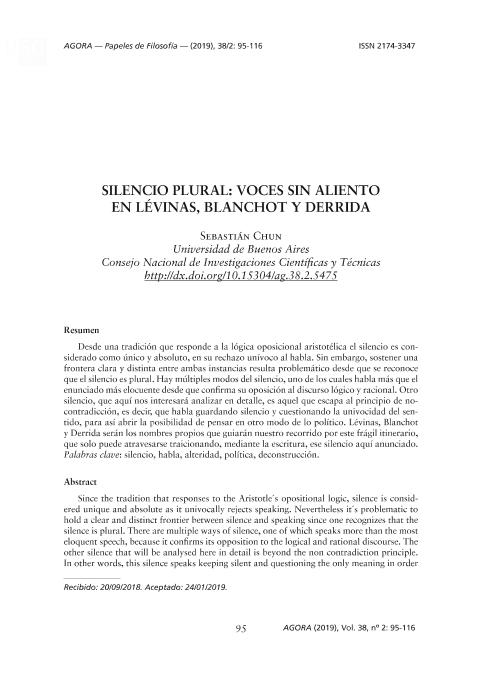Mostrar el registro sencillo del ítem
dc.contributor.author
Chun, Sebastián

dc.date.available
2020-10-30T15:36:31Z
dc.date.issued
2019-01
dc.identifier.citation
Chun, Sebastián; El silencio plural: voces sin aliento en Lévinas, Blanchot y Derrida; Universidad de Santiago de Compostela; Agora; 38; 2; 1-2019; 95-116
dc.identifier.issn
2174-3347
dc.identifier.uri
http://hdl.handle.net/11336/117250
dc.description.abstract
Desde una tradición que responde a la lógica oposicional aristotélica el silencio es considerado como único y absoluto, en su rechazo unívoco al habla. Sin embargo, sostener una frontera clara y distinta entre ambas instancias resulta problemático desde que se reconoce que el silencio es plural. Hay múltiples modos del silencio, uno de los cuales habla más que el enunciado más elocuente desde que confirma su oposición al discurso lógico y racional. Otro silencio, que aquí nos interesará analizar en detalle, es aquel que escapa al principio de nocontradicción, es decir, que habla guardando silencio y cuestionando la univocidad del sentido, para así abrir la posibilidad de pensar en otro modo de lo político. Lévinas, Blanchot y Derrida serán los nombres propios que guiarán nuestro recorrido por este frágil itinerario, que solo puede atravesarse traicionando, mediante la escritura, ese silencio aquí anunciado. Palabras clave: silencio, habla, alteridad, política, deconstrucción.
dc.description.abstract
Since the tradition that responses to the Aristotle´s opositional logic, silence is considered unique and absolute as it univocally rejects speaking. Nevertheless it´s problematic to hold a clear and distinct frontier between silence and speaking since one recognizes that the silence is plural. There are multiple ways of silence, one of which speaks more than the most eloquent speech, because it confirms its opposition to the logical and rational discourse. The other silence that will be analysed here in detail is beyond the non contradiction principle. In other words, this silence speaks keeping silent and questioning the only meaning in order to open the possibility of thinking in another way of politics. Lévinas, Blanchot and Derrida will be the proper names that will lead our travel through this fragile itinerary and the only way through is to betray by writing the silence here announced.
dc.format
application/pdf
dc.language.iso
spa
dc.publisher
Universidad de Santiago de Compostela
dc.rights
info:eu-repo/semantics/openAccess
dc.rights.uri
https://creativecommons.org/licenses/by-nc-nd/2.5/ar/
dc.subject
SILENCIO
dc.subject
HABLA
dc.subject
ALTERIDAD
dc.subject
POLÍTICA
dc.subject.classification
Otras Filosofía, Étnica y Religión

dc.subject.classification
Filosofía, Ética y Religión

dc.subject.classification
HUMANIDADES

dc.title
El silencio plural: voces sin aliento en Lévinas, Blanchot y Derrida
dc.type
info:eu-repo/semantics/article
dc.type
info:ar-repo/semantics/artículo
dc.type
info:eu-repo/semantics/publishedVersion
dc.date.updated
2020-10-29T20:03:17Z
dc.journal.volume
38
dc.journal.number
2
dc.journal.pagination
95-116
dc.journal.pais
España

dc.journal.ciudad
Santiago de Compostela
dc.description.fil
Fil: Chun, Sebastián. Universidad de Buenos Aires; Argentina. Consejo Nacional de Investigaciones Científicas y Técnicas; Argentina
dc.journal.title
Agora

dc.relation.alternativeid
info:eu-repo/semantics/altIdentifier/doi/http://dx.doi.org/10.15304/ag.38.2.5475
dc.relation.alternativeid
info:eu-repo/semantics/altIdentifier/url/https://revistas.usc.gal/index.php/agora/article/view/5475
Archivos asociados
